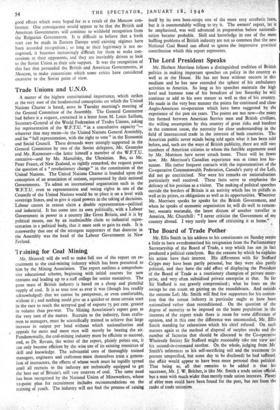rj r _lining for Coal Mining
Mr. Shinwell will do well to make. full use of the report on re- cruitment to the coal-mining industry which has been presented to him by the Mining Association. The report outlines a comprehen- sive educational scheme, beginning with initial courses for new entrants and leading up to a staff college for senior executives. The great mass of British industry is based on a cheap and plentiful supply of coal. It is as true now as ever it was (though less readily acknowledged) that we cannot be prosperous, or even comfortable, without it ; and nothing could give us a quicker or more certain start in the race to reach the accepted goal of exports 75 per cent, greater in volume than pre-war. The Mining Association's report goes to the very root of the matter. Recruits to the industry, from crafts- men to managers, must be scientifically trained to achieve that large increase in output per head without which nationalisation and appeals for more and more men will merely be beating the air. Fundamentally, the coal-mining industry must be efficient to succeed, and, as Dr. Revans, the writer of the report, plainly points out, it can only become efficient by the wise use of its existing resources of skill and knowledge. The substantial core of thoroughly trained managers, engineers and craftsmen must themselves train a genera- lion of instructors, the effects of whose work must be rapidly spread until all recruits to the industry are technically equipped to get the best out of Britain's still vast reserves of coal. The same need has been recognised by the National Union of Mineworkers, whose 12-point plan for recruitment includes recommendations on the training of youth. The industry will not find the process of raising itself by its own boot-straps one of the more easy acrobatic feats, but it is commendably willing to try it. The owners' report, let it be emphasised, was well advanced in preparation before nationali- sation became probable. Skill and knowledge in one of the most baffling problems of British industry are not so common that the new National Coal Board can afford to ignore the impressive practical contribution which this report represents.


























 Previous page
Previous page